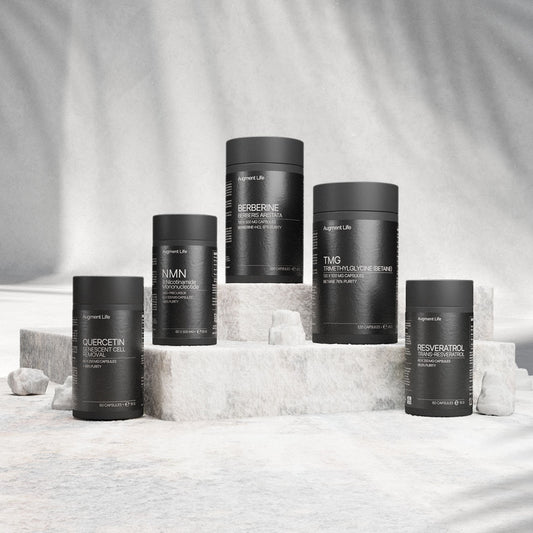Resveratrol is a plant-derived polyphenol that occurs naturally in grape skin and seeds. The most active form of resveratrol – trans-resveratrol – is known to activate the SIRT1 longevity gene and may exert beneficial effects on the aging brain.
But does resveratrol potentially affect learning, memory performance, and hippocampus functional connectivity in aging?
In this article, we will explore the effects of long-term resveratrol consumption on memory performance and hippocampal functionality – both of which are associated with age-related cognitive decline.
Key Takeaways:
- Aging is a natural process of development associated with structural and functional changes in the brain that can result in cognitive impairment.
- Supplementation with resveratrol may improve memory performance and hippocampal functional connectivity in healthy adults associated with improved glucose metabolism and decreased body fat.
- Although little evidence exists for any specific activity protecting against age-related decline, healthy lifestyles may decrease the rate of cognitive decline seen with aging and help delay the onset of mental symptoms.
Aging and Cognition
With the global rise in lifespan and the aging population, cognitive decline has emerged as a health and social issue. Some mental abilities decline from middle age onwards, including memory, executive functions, processing speed, and reasoning. These abilities are essential for everyday activities, living independently, and leading a fulfilling life1.
Aging is a normal developmental process associated with structural and functional changes in the brain, including alterations in neuronal structure without neuronal death, loss of synapses, and dysfunction of neuronal networks. These age-related changes in the structure and function of synapses and the neuronal networks correlate with cognitive decline in aging2.
Age-related diseases accelerate the rate of neuronal dysfunction, neuronal loss, and cognitive decline. Some risk factors for dementia (pathological states) also increase the risk of normal cognitive decline1:
- age,
- hypertension,
- diabetes,
- physical fitness,
- and education.
Understanding the risk factors for and mechanisms of age-related cognitive changes is challenging, but this understanding can help researchers to find tools to improve aging.
The Effects of Resveratrol on Memory Performance and Hippocampus Connectivity
Resveratrol is a safe and well-tolerated compound found in many foods, such as grapes, red wine, peanuts, and blueberries. Non-clinical studies have shown that resveratrol is a potent anti-aging compound. Its anti-aging mechanisms include suppressing oxidative stress, relieving inflammatory reactions, improving mitochondrial function, and regulating apoptosis3. Thus, resveratrol consumption is emerging as a strategy to maintain brain health during aging.
A double-blind, placebo-controlled study assessed the effects of resveratrol supplementation (200mg/day). Healthy overweight adults (50-80 years old, body mass index of 25 - 30 kg/m2) were tested on memory tasks and neuroimaging to assess the volume, microstructure, and resting-state functional connectivity of the hippocampus – a critical region involved in memory functions4.
After 26 weeks of treatment, subjects of the resveratrol group showed an improved memory performance with substantial increases in functional connectivity of the hippocampus to frontal, parietal, and occipital areas compared with the placebo. These increases observed in the participants after resveratrol consumption reflect improvements in the integrity and functionality of the hippocampus4.
Resveratrol consumption reduced glycated hemoglobin (HbA1c, the long-term marker of glucose control) and body fat, indicating that it improves energy metabolism. Some studies suggested that the hippocampus is particularly vulnerable to disturbances in glucose supply and metabolism4.
Recent research assessed the effects of resveratrol supplementation (200mg/day) on healthy subjects (60-79 years old) with a wide body-mass index range (21-37 kg/m2). The study failed to show significant improvements after six months of resveratrol. Both groups presented an increase in body fat and cholesterol over time and a decrease in physical activity at follow-up. This lack of results was associated with unfavorable changes in lifestyle, decreases in brain-derived neurotrophic factors, and an increase in inflammatory markers5.
Main Findings
After prolonged resveratrol consumption, healthy subjects improved memory performance, glucose metabolism, and hippocampal functional connectivity. These results indicate that resveratrol exerts neuroprotective effects within the hippocampus and improves connectivity networks in healthy adults4.
In subjects with a wide body-mass index range, the lack of results was associated with adverse changes in lifestyle. There is emerging evidence that healthy lifestyles decrease cognitive decline seen with aging and help delay the onset of mental symptoms in age-associated diseases2. So, lifestyle changes could be crucial to healthy aging.
- Deary, I.J., Corley, J., Gow, A.J., Harris, S.E., Houlihan, L.M., et al. Age-associated cognitive decline. British Medical Bulletin 92, 135–152 (2009). https://doi.org/10.1093/bmb/ldp033
- Murman, D.L. The Impact of Age on Cognition. Semin Hear 36(3), 111-21 (2015). https://doi.org/10.1055/s-0035-1555115
- Zhou, D.D., Luo, M., Huang, S.Y., Saimaiti, A., Shang, A. et al. Effects and Mechanisms of Resveratrol on Aging and Age-Related Diseases. Oxid Med Cell Longev 2021 (2021). https://doi.org/10.1155/2021/9932218
- Witte, A.V., Kerti, L., Margulies, D.S., Flöel, A. Effects of resveratrol on memory performance, hippocampal functional connectivity, and glucose metabolism in healthy older adults. J Neurosci 34(23), 7862-70 (2014). https://doi.org/10.1523/JNEUROSCI.0385-14.2014
- Huhn, S., Beyer, F., Zhang, R., Lampe, L., Grothe, J. et al. Effects of resveratrol on memory performance, hippocampus connectivity and microstructure in older adults - A randomized controlled trial. Neuroimage 174, 177-190 (2018). https://doi.org/10.1016/j.neuroimage.2018.03.023









